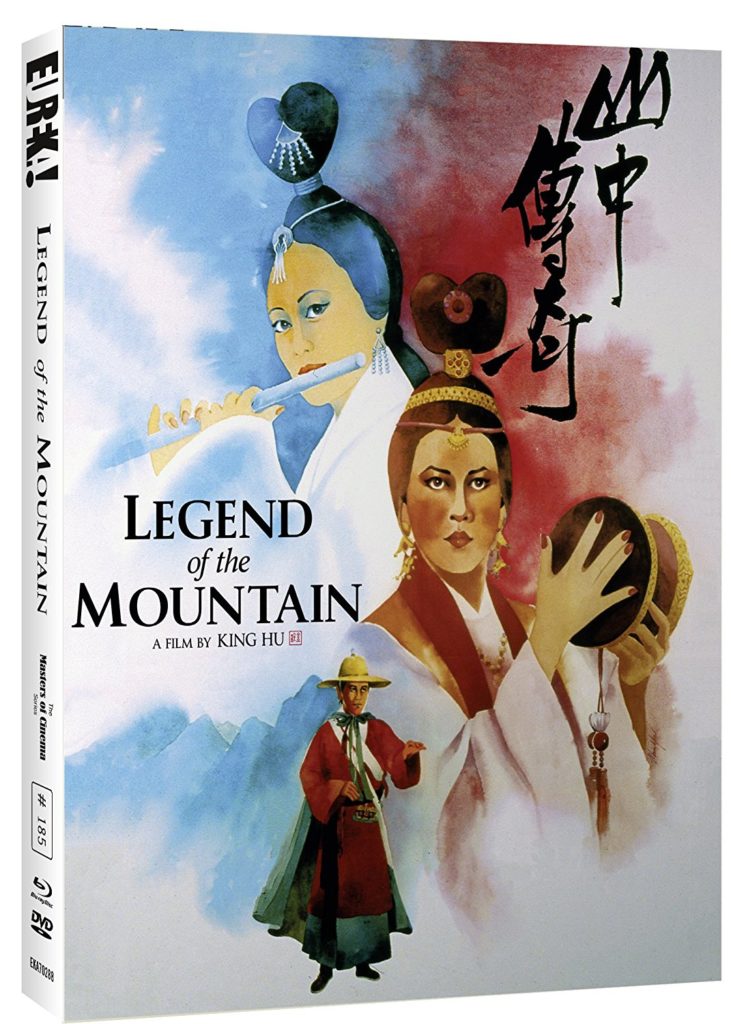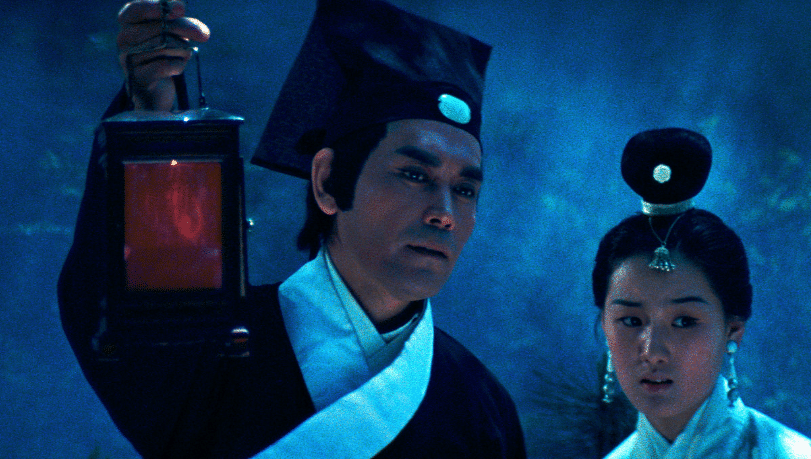 Whilst I have something of a handle on Japanese cinema of the 70s and 80s – well, in so far as the films have made the great leap to Western screens – I know comparatively little about Chinese cinema of the same period, and in that I have to include Hong Kong/Taiwan. I’ve seen a couple of hopping vampires (hopping because they still have their winding sheets on) and a handful of crime dramas, but not a lot else. Compared to Japan, China, HK and Taiwan are, by and large, a closed book. I’m aware, though, that the director of Legend of the Mountain, King Hu, moved from acting to directing, and that the film under consideration here is oft considered to be his magnum opus. An epic it certainly is; rocking in at over three hours, it’s a lengthy, visually incredibly accomplished Chinese folk tale, which uses its ample screen time to do a great deal of quite disparate things along the way.
Whilst I have something of a handle on Japanese cinema of the 70s and 80s – well, in so far as the films have made the great leap to Western screens – I know comparatively little about Chinese cinema of the same period, and in that I have to include Hong Kong/Taiwan. I’ve seen a couple of hopping vampires (hopping because they still have their winding sheets on) and a handful of crime dramas, but not a lot else. Compared to Japan, China, HK and Taiwan are, by and large, a closed book. I’m aware, though, that the director of Legend of the Mountain, King Hu, moved from acting to directing, and that the film under consideration here is oft considered to be his magnum opus. An epic it certainly is; rocking in at over three hours, it’s a lengthy, visually incredibly accomplished Chinese folk tale, which uses its ample screen time to do a great deal of quite disparate things along the way.
Based on a tale which dates to the Song Dynasty – a period from the 900s to the 1200s, so (for context) roughly the time that Northern Europe was being redrawn by the Viking Age – Legend of the Mountain follows the fortunes of a young copyist, enlisted to copy a Buddhist sutra. In Buddhist belief, this is a sanctified text which has tremendous power over the spirits of the dead; these dead are beings which themselves are quite unlike Western ghosts with their diaphanous forms, something which makes sense as the film goes on. Our young man Yungqing is not a Buddhist himself, and although he appreciates the importance of the task, he assumes that it’ll be a job like any other. A job like any other, with three hours to go? Naive.
He receives the texts for copying from the sumptuous monastery which is giving him the job, and then he heads off to do this important work in peace, walking for seemingly days into the countryside to find a suitable retreat. Before he even reaches his destination, however, he begins to encounter strange people who do not act the way he clearly expects them to act. Two mysterious women – Melody (Feng Hsu) and Cloud (Sylvia Chang) take an especial interest in him, and the other inmates of his remote mountain lodge are just as strange in their own ways. Evidently, supernatural forces are at work, and certain entities want the all-powerful sutra for themselves. Yungqing will need all of his wits to finish his employment, and get himself back to civilisation in one piece.
 This entire project screams classic China: abundant landscapes are presented in a highly colourised, painterly manner, and traditional Chinese instrumentation accompanies the action throughout. Then, of course, the subject matter itself is based on ancient folklore, and to an extent this film is a piece of Far Eastern folk horror, albeit that the film never settles into this mode completely. Supernatural elements underpin the story, and the director works hard within his means to produce some subtle, uncanny scenes. But this film is many other things, to the extent that it never really takes its place in any genre, in an expected sense. It has an eye for historical detail, but also flits between being a pastoral, a romance, a reminiscence and – when it’s not adding comedic elements and the obligatory martial arts scenes to this melee – it even dabbles in Buddhist philosophy, ruminating on life, love and everything. Overall, Legend of the Mountain does a great, great deal. Well, the film is immensely long, and I’ll say it, as ever; it’s rather too long for my tastes, and despite its pleasant visuals and overall engaging subject matter, it veers from cramming in more and more plot elements to lengthy, even unnecessary forays through the woods. As it’s nearly forty years old, I can’t even say it’s falling in behind the new tendency to make films increasingly longer.
This entire project screams classic China: abundant landscapes are presented in a highly colourised, painterly manner, and traditional Chinese instrumentation accompanies the action throughout. Then, of course, the subject matter itself is based on ancient folklore, and to an extent this film is a piece of Far Eastern folk horror, albeit that the film never settles into this mode completely. Supernatural elements underpin the story, and the director works hard within his means to produce some subtle, uncanny scenes. But this film is many other things, to the extent that it never really takes its place in any genre, in an expected sense. It has an eye for historical detail, but also flits between being a pastoral, a romance, a reminiscence and – when it’s not adding comedic elements and the obligatory martial arts scenes to this melee – it even dabbles in Buddhist philosophy, ruminating on life, love and everything. Overall, Legend of the Mountain does a great, great deal. Well, the film is immensely long, and I’ll say it, as ever; it’s rather too long for my tastes, and despite its pleasant visuals and overall engaging subject matter, it veers from cramming in more and more plot elements to lengthy, even unnecessary forays through the woods. As it’s nearly forty years old, I can’t even say it’s falling in behind the new tendency to make films increasingly longer.
Still, Legend of the Mountain showed me some elements of Chinese folklore which I’ve never seen before, and it offers an interesting window onto 1970s filmmaking of the era. Anyone with a completist’s interest in cinema of the Far East would be rewarded with an excellent 4K quality remaster, all crisp lines, good colours and clear sound for seeking this out.
Legend of the Mountain is available now via the Eureka! Masters of Cinema series.
